Midweek Review
Sri Lanka walking a diplomatic tightrope
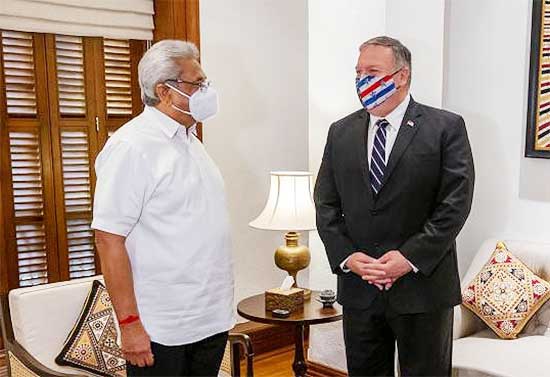
Oct 28, 2020: President Gotabaya Rajapaksa receives US Secretary of State Mike Pompeo at the Presidebtial Secretariat (pic courtesy President’s Office)
By Shamindra Ferdinando
Among a spate of diplomatic appointments made by President Gotabaya Rajapaksa, none triggered opposition from those who had backed his presidential candidature as the appointment of Milinda Moragoda as Sri Lanka’s High Commissioner in New Delhi.
The one-time top UNP Minister, and a former close confidant of beleaguered UNP Chief Ranil Wickremesinghe, Moragoda, who had proved his negotiating skills, both here and abroad, received the appointment at a crucial time as Sri Lanka struggles to maintain a much required balance, in its foreign relations, in the wake of the rapidly evolving catastrophic US-China confrontation under Trump Presidency. Hopefully after President-elect Joe Biden assumes reins in Washington, things will be tackled more with brains by both sides than with military brawn, for the sake of survivability of all life on earth as the nature’s balance has already been badly damaged without nukes going off in the event of a future war, finishing the job in extra quick time.
The recent clear victory, secured by President-elect Joe Biden, may halt further deterioration of US-China relations. But, it is too early to reach a final conclusion as regards US-China relations or US-Iran dealings, badly damaged by outgoing US President Donald Trump’s bellicose actions.
Sri Lanka’s political leadership needs to keep (in mind that in spite of the incumbent Republican’s departure from the White House in January 2021), the policy adopted by the quartet led by the sole superpower US, also comprising Japan, Australia and India, vis-a-vis Sri Lanka, is expected to remain the same. The grouping’s policy will be primarily influenced by Sri Lanka’s relationship with China, especially against the backdrop of the much-deteriorated China-India relations.
Moragoda’s appointment received the approval of the Parliament, amidst a campaign directed at the former Minister, who played a significant role in Wickremesinghe’s disastrous efforts to settle the North-East issue, with the help of the Norwegians. Those who opposed Moragoda’s appointment found fault with him over his controversial role as an UNPer, as well as an opinion maker. They made representations to the Parliamentary High Posts Committee, chaired by Speaker Mahinda Yapa Abeywardena, against Moragoda’s appointment. The Parliament obviously rejected criticisms of Moragoda’s conduct, as a politician, hence the unanimous approval.
In the wake of the attacks on Moragoda, as well as criticism of government decisions, as regards some other appointments, President Gotabaya Rajapaksa explained his position in this regard. The President resorted to the issuance of an unprecedented statement defending the appointments made by his government. Those backing the government, but strongly opposed to some of the appointments, extensively used social media to target the nominees. Moragoda was repeatedly attacked. National Freedom Front leader Wimal Weerawansa, who is also a member of the cabinet, publicly questioned Moragoda’s conduct and his brainchild, Pathfinder Organization. Weerawansa even categorized the Pathfinder Organization as a CIA front. Whatever the criticism, as regards the founder of the Pathfinder Oganisation, the new envoy to New Delhi can certainly articulate the President’s stand. Moragoda, both in and out of the Parliament, enjoyed excellent relations with influential countries.
Prez won’t succumb to pressure
In a statement headlined ‘No intention of changing appointments recently made after deep thought in the face of pressure’ the President urged distractors not to undermine those who had been chosen by the government. The President’s Office issued the following statement on Sept. 2, 2020: “Pressure is being mounted against certain appointments recently made by the President and the Government. All these appointments were made with the utmost consideration of our country’s sovereignty, national security and implementation of the Saubhagyaye Dekma policy statement. Also, the President emphasizes such appointments have been made after careful scrutiny of loyalty to the nation, qualifications and background of these individuals so that policies of the Government can move forward in a successful manner.
The President stressed that he had no intention of changing such appointments, made after deep thinking, or to replace them with different persons in the face of pressure. As such, the President politely requests everyone not to pressure him or the Government to change these appointments.
The President is of the view that expressing opinions against these appointments will not only make the appointees unable to carry out their duties and responsibilities, properly, but also will weaken the Government’s process, by underestimating them in the society.”
In addition to Moragoda’s appointment, the President picked veteran career diplomat Ravinatha Aryasinha, former career diplomat Palitha Kohona, and political commentator and author C.A. Chandraprema as Sri Lanka’s top envoys in Washington, Beijing and Geneva, respectively. Former Chief Justice Mohan Peiris is Sri Lanka’s Permanent Representative in New York.
The recent change, in the US administration, is unlikely to change their policy towards Sri Lanka as Washington’s growing dependence on New Delhi, to meet the Chinese challenge, remains a key push factor. Western powers and India are certain to respond to the growing China-Sri Lanka political relations, as highlighted by the recent statement issued by the Chinese Embassy in Colombo. The statement issued by the Embassy dealt with high level talks that had taken place close on the heels of US Secretary Mike Pompeo’s visit, just ahead of the US presidential election. The Donald Trump administration, without doubt, sought to influence the voters of Indian origin, by Pompeo’s two-day visit to New Delhi, before arriving in Colombo on Oct 27th. The US also participated in the high profile Malabar 2020 maritime exercise, involving India, Japan and Australia, in the Bay of Bengal, ahead of the US election. Trump’s rival Biden had Kamala Harris, of Tamil origin, as his running mate. She is the first immigrant and the first woman ever to become the US Vice President. She is also the first African-American woman, the first Indian-American, and the first Asian-American US Vice President.
Biden-Kamala Harris strategy
In spite of some sections of the Sri Lankan community expressing fears of Harris, being of Indian origin, she shouldn’t be a serious concern as the US policy on Sri Lanka is unlikely to be shaped by an individual. But the Democratic politics can be quite hostile, much more aggressive than the Republican response to Sri Lanka. How can Sri Lanka forget the US forcing Sri Lanka to co-sponsor the Geneva resolution in the wake of the then Sri Lanka’s Permanent Representative in Geneva, Ravinatha Aryasinha, strongly objecting to the draft resolution, at the first informal session with the then US-led Core Group. Premier Wickremesinghe and Foreign Minister Mangala Samaraweera overruled Aryasinha, who co-sponsored the resolution on Oct 1, 2015.
Sri Lanka, under whatever the circumstances, cannot forget that the previous yahapalana government co-sponsored an accountability resolution in the Geneva-based United Nations Human Rights Council (UNHRC) in Oct 2015 during Barack Obama’s Democratic administration. The Democrats are back. The US quit the UNHRC, in June 2018, at the behest of President Trump whose administration, while ridiculing the Geneva body, ensured the continuation of the process meant to debase Sri Lanka. US ally, the UK, now spearheads the US initiated project.
Sri Lanka should strongly push for re-examination of the Geneva resolution, adopted on the basis of unsubstantiated war crimes allegations. Contrary to claims, there is absolutely no change in the Geneva stand, vis-a-vis war crimes allegations directed at Sri Lanka. A statement issued by the UK’s International Ambassador for Human Rights, Rita French, on Feb 27, 2020, on behalf of the Core Group on Sri Lanka (Canada, Germany, North Macedonia, Montenegro and the UK) underscored the need to expose Western lies.
Core Group repeats US stand
 Let me reproduce Ambassador French’s statement verbatim: “In 2015, Sri Lanka co-sponsored resolution 30/1, which provided a framework to address the legacy of conflict and build the foundations for sustainable and inclusive peace. Sri Lanka committed to delivering progress on accountability, reconciliation and human rights with the support of the Council and reaffirmed those commitments through two further resolutions. As the High Commissioner’s report highlights, these resolutions have their origins in Sri Lanka’s domestic processes.
Let me reproduce Ambassador French’s statement verbatim: “In 2015, Sri Lanka co-sponsored resolution 30/1, which provided a framework to address the legacy of conflict and build the foundations for sustainable and inclusive peace. Sri Lanka committed to delivering progress on accountability, reconciliation and human rights with the support of the Council and reaffirmed those commitments through two further resolutions. As the High Commissioner’s report highlights, these resolutions have their origins in Sri Lanka’s domestic processes.
“These resolutions are hugely significant for Sri Lanka and for this Council. They marked the end of a period of confrontation with voted resolutions and an international investigation. They heralded the start of a partnership and a sense of common purpose between Sri Lanka and the Council.
“From 2015, important steps have been taken, as recognized in successive Council reports. We join the High Commissioner in welcoming the significant progress in institution building, including through the establishment of the Office of Reparations and the Office on Missing Persons. Fulfillment of the mandates of these offices would bring hope to those left behind, following tens of thousands of cases of enforced disappearances over many years.
“Following the resolution, human rights defenders, academics and journalists, have had more freedom and experienced less intimidation. However, we share the High Commissioner’s concern at the growing number of reports of harassment and surveillance of human rights defenders and victims of human rights violations. The protection of civil society, independent media and human rights institutions, from intimidation, remains critical to fulfill Sri Lanka’s commitment to a free and open democratic society, both in the build up to, and beyond the upcoming Parliamentary elections.
“We are deeply disappointed and concerned that the government has changed its approach to the resolution. We remain profoundly committed to resolution 30/1 and its principles of reconciliation, accountability, inter-communal harmony, and justice for victims of conflict.
“We urge the government of Sri Lanka to advance all of these principles and to ensure a prosperous and inclusive Sri Lanka for which the rule of law and ending impunity are a fundamental basis.
“We encourage the government of Sri Lanka to continue cooperation and dialogue with the Council, the OHCHR, and UN human rights mechanisms, to facilitate progress towards a lasting peace where the rights of all of Sri Lanka’s people can flourish.”
Sri Lanka’s pathetic failure to counter the propaganda, has facilitated the high profile Western campaign, directed at the war-winning political and military leaderships, much to the disappointment of the vast majority of people. Negligence, on the part of successive administrations, facilitated the Western project, as the country continued to be categorized as a major human rights violator, and repeatedly demonized. One year after the last presidential election, Sri Lanka is yet to take tangible measures to challenge the Geneva resolution, though it announced the withdrawal from the Geneva resolution. Quitting the Geneva process is certainly not the answer to the Western propaganda project, directed at Sri Lanka. Instead, Sri Lanka should take appropriate measures to formulate a cohesive response to the Geneva resolution, based on lies. Successive governments had facilitated continuation of the anti-Sri Lanka project by conveniently holding back an efficient response to unsubstantiated war crime accusations.
TNA seeks to exploit Biden victory
One-time LTTE mouthpiece, the TNA, on Sunday (Nov. 8) congratulated US President-elect Joe Biden and his deputy Kamala Harris. The TNA is the first Sri Lankan party to applaud Biden and Harris for winning the US election. A much weaker TNA comprises Illankai Thamil Arasu Kadchi (ITAK) and three ex-terrorist groups, namely TELO, PLOTE and EPRLF, funded and armed by India, in the ’80s. The TNA will certainly go all out to win the sympathy of the new US administration. The TNA, in a statement issued on Sunday, said: “As the premier political party, representing the Tamil people in Sri Lanka, we congratulate President-elect Joe Biden and Vice President-elect Kamala Harris on a momentous victory.”
The TNA worked closely with successive US administrations to undermine the Rajapaksas. TNA Chief R. Sampanthan backed war-,winning Army Commander the then General Sarath Fonseka’s presidential candidature at the January 2010 election, the first national poll after the successful conclusion of the war the year before. Sampanthan, in spite of initial reservations when the US asked for his backing for the UNP-led coalition, against President Mahinda Rajapaksa, joined the grouping. The TNA delivered all eight electoral districts, including Digamadulla, to Fonseka.
The TNA backed Maithripala Sirisena and Sajith Premadasa at the 2015 and 2019 presidential elections, too, though the latter project went awry. Premadasa, though backed by minority political parties, represented in Parliament, suffered a heavy defeat at the hands of Gotabaya Rajapaksa, whose candidature, at the presidential poll, seemed so unlikely, due to the unprecedented legal challenge, that a jittery SLPP leadership got Chamal Rajapaksa to pay the required deposit to contest as an independent. The judiciary ruled in favour of Gotabaya Rajapaksa.
In the wake of Premadasa’s defeat, the TNA suffered a major setback in the Northern and Eastern Provinces, at the parliamentary election, last August. The TNA was reduced to just 10 seats, whereas its rivals increased their tally there. In the previous Parliament, the TNA had 16 seats, though two deserted the coalition later. At the height of the LTTE-TNA project, when the combine enjoyed exclusive power in the Northern and Eastern regions, the grouping had 22 seats. In spite of being significantly weakened, both in and out of Parliament, the TNA remained a force to be reckoned with, due to its cozy relationship with Colombo’s Western diplomatic community. Regardless of waning of the TNA’s clout, in the current Parliament, the grouping’s stand has been strengthened by the entry of former Northern Province Chief Minister C.V. Wigneswaran (2013-2018) and Gajendrakumar Ponnambalam, from different parties.
The TNA wielded so much power, during the Sirisena-Wickremesinghe administration (Jan 2015- Nov 2019), on behalf of the party, its Jaffna district MP M.A. Sumanthiran revealed in Washington the existence of an agreement for the inclusion of foreign judges in a hybrid war crimes court, constituted in terms of the Geneva Resolution. The declaration was made in June 2016 in the presence of the then Sri Lanka’s Ambassador in Washington Prasad Kariyawasam. An utterly inept parliament never even bothered to at least to raise President’s Counsel Sumanthiran’s explosive revelation. Interestingly, the Sri Lankan Embassy, in Washington, issued a statement regarding the event where Sumanthiran made the revelation, in the presence of the Ambassador, but conveniently refrained from making reference to TNA heavyweight’s comment on foreign judges.
Sumanthiran declared that his party reached a tripartite consensus in respect of foreign judges, defence attorneys, investigators, etc., in a Sri Lankan judicial mechanism, before the Geneva Council unanimously adopted Resolution 30/1.
The MP told the 2016 American ‘Congressional Caucus for Ethnic and Religious Freedom in Sri Lanka’, in Washington, that the government of Sri Lanka, the TNA and the US negotiated the agreement.
MP Sumanthiran stressed that the 2015 resolution was moved in Geneva following an understanding that the participation of foreigners wouldn’t be contrary to Sri Lanka’s Constitution. Declaring that he had been personally involved in the negotiations, with the United States of America also participating in that particular process, Sumanthiran said: “There were some doubts created, as to whether the Constitution of Sri Lanka would allow for foreign nationals to function as judges and we went into that question, clarified it, and said yes they can”.
Sumanthiran told the Congressional Caucus that the resolution adopted in Geneva, had been negotiated and they settled for a hybrid model, though they originally asked for an international inquiry.
As long as Sri Lanka fails to prove war crimes accusations are wrong, the project will continue, regardless of the change of administrations in the US.
In the run-up to the presidential and parliamentary polls, in January and August, 2015, respectively, the country was told that the threat of war crimes probe would end with the ouster of the then President Mahinda Rajapaksa. The yahapalana leaders proudly declared that as they would restore faith in the judiciary, the issue of foreign judges was irrelevant. Over five years later, Sri Lanka remains accused of committing war crimes, in spite of having the wherewithal to successfully counter them. Vital information that can be used to set the record straight, gather dust as the parties hell bent on dividing the country on ethnic lines, advance their strategy.
- News Advertiesment
See Kapruka’s top selling online shopping categories such as Toys, Grocery, Flowers, Birthday Cakes, Fruits, Chocolates, Clothing and Electronics. Also see Kapruka’s unique online services such as Money Remittence,News, Courier/Delivery, Food Delivery and over 700 top brands. Also get products from Amazon & Ebay via Kapruka Gloabal Shop into Sri Lanka.
Midweek Review
‘Professor of English Language Teaching’
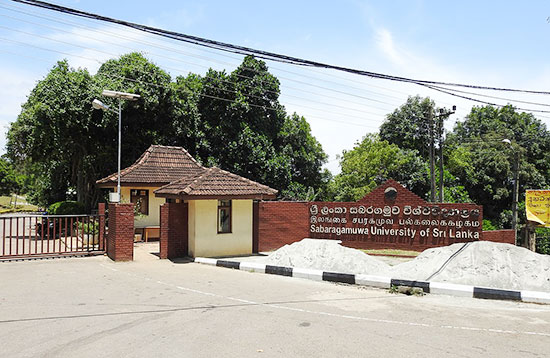
It is a pleasure to be here today, when the University resumes postgraduate work in English and Education which we first embarked on over 20 years ago. The presence of a Professor on English Language Teaching from Kelaniya makes clear that the concept has now been mainstreamed, which is a cause for great satisfaction.
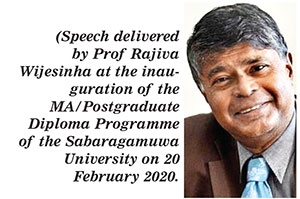 Twenty years ago, this was not the case. Our initiative was looked at askance, as indeed was the initiative which Prof. Arjuna Aluwihare engaged in as UGC Chairman to make degrees in English more widely available. Those were the days in which the three established Departments of English in the University system, at Peradeniya and Kelaniya and Colombo, were unbelievably conservative. Their contempt for his efforts made him turn to Sri Jayewardenepura, which did not even have a Department of English then and only offered it as one amongst three subjects for a General Degree.
Twenty years ago, this was not the case. Our initiative was looked at askance, as indeed was the initiative which Prof. Arjuna Aluwihare engaged in as UGC Chairman to make degrees in English more widely available. Those were the days in which the three established Departments of English in the University system, at Peradeniya and Kelaniya and Colombo, were unbelievably conservative. Their contempt for his efforts made him turn to Sri Jayewardenepura, which did not even have a Department of English then and only offered it as one amongst three subjects for a General Degree.
Ironically, the most dogmatic defence of this exclusivity came from Colombo, where the pioneer in English teaching had been Prof. Chitra Wickramasuriya, whose expertise was, in fact, in English teaching. But her successor, when I tried to suggest reforms, told me proudly that their graduates could go on to do postgraduate degrees at Cambridge. I suppose that, for generations brought up on idolization of E. F. C. Ludowyke, that was the acme of intellectual achievement.
I should note that the sort of idealization of Ludowyke, the then academic establishment engaged in was unfair to a very broadminded man. It was the Kelaniya establishment that claimed that he ‘maintained high standards, but was rarefied and Eurocentric and had an inhibiting effect on creative writing’. This was quite preposterous coming from someone who removed all Sri Lankan and other post-colonial writing from an Advanced Level English syllabus. That syllabus, I should mention, began with Jacobean poetry about the cherry-cheeked charms of Englishwomen. And such a characterization of Ludowyke totally ignored his roots in Sri Lanka, his work in drama which helped Sarachchandra so much, and his writing including ‘Those Long Afternoons’, which I am delighted that a former Sabaragamuwa student, C K Jayanetti, hopes to resurrect.
I have gone at some length into the situation in the nineties because I notice that your syllabus includes in the very first semester study of ‘Paradigms in Sri Lankan English Education’. This is an excellent idea, something which we did not have in our long-ago syllabus. But that was perhaps understandable since there was little to study then except a history of increasing exclusivity, and a betrayal of the excuse for getting the additional funding those English Departments received. They claimed to be developing teachers of English for the nation; complete nonsense, since those who were knowledgeable about cherries ripening in a face were not likely to move to rural areas in Sri Lanka to teach English. It was left to the products of Aluwihare’s initiative to undertake that task.
Another absurdity of that period, which seems so far away now, was resistance to training for teaching within the university system. When I restarted English medium education in the state system in Sri Lanka, in 2001, and realized what an uphill struggle it was to find competent teachers, I wrote to all the universities asking that they introduce modules in teacher training. I met condign refusal from all except, I should note with continuing gratitude, from the University of Sri Jayewardenepura, where Paru Nagasunderam introduced it for the external degree. When I started that degree, I had taken a leaf out of Kelaniya’s book and, in addition to English Literature and English Language, taught as two separate subjects given the language development needs of students, made the third subject Classics. But in time I realized that was not at all useful. Thankfully, that left a hole which ELT filled admirably at the turn of the century.
The title of your keynote speaker today, Professor of English Language Teaching, is clear evidence of how far we have come from those distant days, and how thankful we should be that a new generation of practical academics such as her and Dinali Fernando at Kelaniya, Chitra Jayatilleke and Madhubhashini Ratnayake at USJP and the lively lot at the Postgraduate Institute of English at the Open University are now making the running. I hope Sabaragamuwa under its current team will once again take its former place at the forefront of innovation.
To get back to your curriculum, I have been asked to teach for the paper on Advanced Reading and Writing in English. I worried about this at first since it is a very long time since I have taught, and I feel the old energy and enthusiasm are rapidly fading. But having seen the care with which the syllabus has been designed, I thought I should try to revive my flagging capabilities.
However, I have suggested that the university prescribe a textbook for this course since I think it is essential, if the rounded reading prescribed is to be done, that students should have ready access to a range of material. One of the reasons I began while at the British Council an intensive programme of publications was that students did not read round their texts. If a novel was prescribed, they read that novel and nothing more. If particular poems were prescribed, they read those poems and nothing more. This was especially damaging in the latter case since the more one read of any poet the more one understood what he was expressing.
Though given the short notice I could not prepare anything, I remembered a series of school textbooks I had been asked to prepare about 15 years ago by International Book House for what were termed international schools offering the local syllabus in the English medium. Obviously, the appalling textbooks produced by the Ministry of Education in those days for the rather primitive English syllabus were unsuitable for students with more advanced English. So, I put together more sophisticated readers which proved popular. I was heartened too by a very positive review of these by Dinali Fernando, now at Kelaniya, whose approach to students has always been both sympathetic and practical.
I hope then that, in addition to the texts from the book that I will discuss, students will read other texts in the book. In addition to poetry and fiction the book has texts on politics and history and law and international relations, about which one would hope postgraduate students would want some basic understanding.
Similarly, I do hope whoever teaches about Paradigms in English Education will prescribe a textbook so that students will understand more about what has been going on. Unfortunately, there has been little published about this but at least some students will I think benefit from my book on English and Education: In Search of Equity and Excellence? which Godage & Bros brought out in 2016. And then there was Lakmahal Justified: Taking English to the People, which came out in 2018, though that covers other topics too and only particular chapters will be relevant.
The former book is bulky but I believe it is entertaining as well. So, to conclude I will quote from it, to show what should not be done in Education and English. For instance, it is heartening that you are concerned with ‘social integration, co-existence and intercultural harmony’ and that you want to encourage ‘sensitivity towards different cultural and linguistic identities’. But for heaven’s sake do not do it as the NIE did several years ago in exaggerating differences. In those dark days, they produced textbooks which declared that ‘Muslims are better known as heavy eaters and have introduced many tasty dishes to the country. Watalappam and Buriani are some of these dishes. A distinguished feature of the Muslims is that they sit on the floor and eat food from a single plate to show their brotherhood. They eat string hoppers and hoppers for breakfast. They have rice and curry for lunch and dinner.’ The Sinhalese have ‘three hearty meals a day’ and ‘The ladies wear the saree with a difference and it is called the Kandyan saree’. Conversely, the Tamils ‘who live mainly in the northern and eastern provinces … speak the Tamil language with a heavy accent’ and ‘are a close-knit group with a heavy cultural background’’.
And for heaven’s sake do not train teachers by telling them that ‘Still the traditional ‘Transmission’ and the ‘Transaction’ roles are prevalent in the classroom. Due to the adverse standard of the school leavers, it has become necessary to develop the learning-teaching process. In the ‘Transmission’ role, the student is considered as someone who does not know anything and the teacher transmits knowledge to him or her. This inhibits the development of the student.
In the ‘Transaction’ role, the dialogue that the teacher starts with the students is the initial stage of this (whatever this might be). Thereafter, from the teacher to the class and from the class to the teacher, ideas flow and interaction between student-student too starts afterwards and turns into a dialogue. From known to unknown, simple to complex are initiated and for this to happen, the teacher starts questioning.’
And while avoiding such tedious jargon, please make sure their command of the language is better than to produce sentences such as these, or what was seen in an English text, again thankfully several years ago:
Read the story …
Hello! We are going to the zoo. “Do you like to join us” asked Sylvia. “Sorry, I can’t I’m going to the library now. Anyway, have a nice time” bye.
So Syliva went to the zoo with her parents. At the entrance her father bought tickets. First, they went to see the monkeys
She looked at a monkey. It made a funny face and started swinging Sylvia shouted: “He is swinging look now it is hanging from its tail its marvellous”
“Monkey usually do that’
I do hope your students will not hang from their tails as these monkeys do.
Midweek Review
Little known composers of classical super-hits
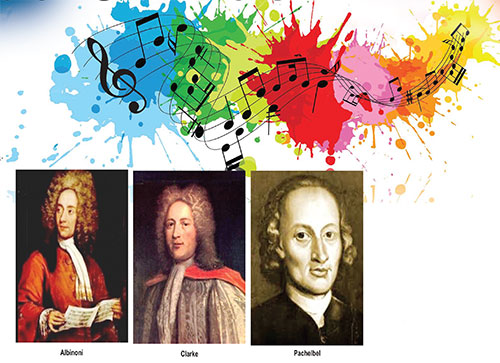
By Satyajith Andradi
Quite understandably, the world of classical music is dominated by the brand images of great composers. It is their compositions that we very often hear. Further, it is their life histories that we get to know. In fact, loads of information associated with great names starting with Beethoven, Bach and Mozart has become second nature to classical music aficionados. The classical music industry, comprising impresarios, music publishers, record companies, broadcasters, critics, and scholars, not to mention composers and performers, is largely responsible for this. However, it so happens that classical music lovers are from time to time pleasantly struck by the irresistible charm and beauty of classical pieces, the origins of which are little known, if not through and through obscure. Intriguingly, most of these musical gems happen to be classical super – hits. This article attempts to present some of these famous pieces and their little-known composers.
Pachelbel’s Canon in D
The highly popular piece known as Pachelbel’s Canon in D constitutes the first part of Johann Pachelbel’s ‘Canon and Gigue in D major for three violins and basso continuo’. The second part of the work, namely the gigue, is rarely performed. Pachelbel was a German organist and composer. He was born in Nuremburg in 1653, and was held in high esteem during his life time. He held many important musical posts including that of organist of the famed St Stephen’s Cathedral in Vienna. He was the teacher of Bach’s elder brother Johann Christoph. Bach held Pachelbel in high regard, and used his compositions as models during his formative years as a composer. Pachelbel died in Nuremburg in 1706.
Pachelbel’s Canon in D is an intricate piece of contrapuntal music. The melodic phrases played by one voice are strictly imitated by the other voices. Whilst the basso continuo constitutes a basso ostinato, the other three voices subject the original tune to tasteful variation. Although the canon was written for three violins and continuo, its immense popularity has resulted in the adoption of the piece to numerous other combinations of instruments. The music is intensely soothing and uplifting. Understandingly, it is widely played at joyous functions such as weddings.
Jeremiah Clarke’s Trumpet Voluntary
The hugely popular piece known as ‘Jeremiah Clarke’s Trumpet Voluntary’ appeared originally as ‘ The Prince of Denmark’s March’ in Jeremiah Clarke’s book ‘ Choice lessons for the Harpsichord and Spinet’, which was published in 1700 ( Michael Kennedy; Oxford Dictionary of Music ). Sometimes, it has also been erroneously attributed to England’s greatest composer Henry Purcell (1659 – 1695 ) and called ‘Purcell’s Trumpet Voluntary (Percy A. Scholes ; Oxford Companion to Music). This brilliant composition is often played at joyous occasions such as weddings and graduation ceremonies. Needless to say, it is a piece of processional music, par excellence. As its name suggests, it is probably best suited for solo trumpet and organ. However, it is often played for different combinations of instruments, with or without solo trumpet. It was composed by the English composer and organist Jeremiah Clarke.
Jeremiah Clarke was born in London in 1670. He was, like his elder contemporary Pachelbel, a musician of great repute during his time, and held important musical posts. He was the organist of London’s St. Paul’s Cathedral and the composer of the Theatre Royal. He died in London in 1707 due to self – inflicted gun – shot injuries, supposedly resulting from a failed love affair.
Albinoni’s Adagio
The full title of the hugely famous piece known as ‘Albinoni’s Adagio’ is ‘Adagio for organ and strings in G minor’. However, due to its enormous popularity, the piece has been arranged for numerous combinations of instruments. It is also rendered as an organ solo. The composition, which epitomizes pathos, is structured as a chaconne with a brooding bass, which reminds of the inevitability and ever presence of death. Nonetheless, there is no trace of despondency in this ethereal music. On the contrary, its intense euphony transcends the feeling of death and calms the soul. The composition has been attributed to the Italian composer Tomaso Albinoni (1671 – 1750), who was a contemporary of Bach and Handel. However, the authorship of the work is shrouded in mystery. Michael Kennedy notes: “The popular Adagio for organ and strings in G minor owes very little to Albinoni, having been constructed from a MS fragment by the twentieth century Italian musicologist Remo Giazotto, whose copyright it is” (Michael Kennedy; Oxford Dictionary of Music).
Boccherini’s Minuet
The classical super-hit known as ‘Boccherini’s Minuet’ is quite different from ‘Albinoni’s Adagio’. It is a short piece of absolutely delightful music. It was composed by the Italian cellist and composer Luigi Boccherini. It belongs to his string quintet in E major, Op. 13, No. 5. However, due to its immense popularity, the minuet is performed on different combinations of instruments.
Boccherini was born in Lucca in 1743. He was a contemporary of Haydn and Mozart, and an elder contemporary of Beethoven. He was a prolific composer. His music shows considerable affinity to that of Haydn. He lived in Madrid for a considerable part of his life, and was attached to the royal court of Spain as a chamber composer. Boccherini died in poverty in Madrid in 1805.
Like numerous other souls, I have found immense joy by listening to popular classical pieces like Pachelbel’s Canon in D, Jeremiah Clarke’s Trumpet Voluntary, Albinoni’s Adagio and Boccherini’s Minuet. They have often helped me to unwind and get over the stresses of daily life. Intriguingly, such music has also made me wonder how our world would have been if the likes of Bach, Handel, Haydn, Mozart, Beethoven, and Schubert had never lived. Surely, the world would have been immeasurably poorer without them. However, in all probability, we would have still had Pachelbel’s Canon in D, Jeremiah Clarke’s Trumpet Voluntary, Albinoni’s Adagio, and Boccherini’s Minuet, to cheer us up and uplift our spirits.
Midweek Review
The Tax Payer and the Tough
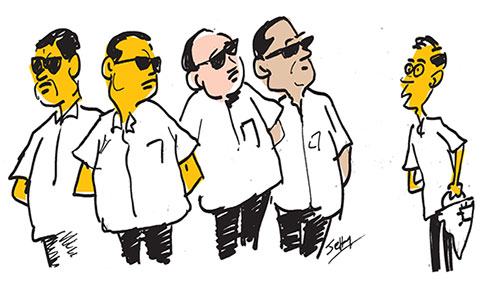
By Lynn Ockersz
The tax owed by him to Caesar,
Leaves our retiree aghast…
How is he to foot this bill,
With the few rupees,
He has scraped together over the months,
In a shrinking savings account,
While the fires in his crumbling hearth,
Come to a sputtering halt?
But in the suave villa next door,
Stands a hulk in shiny black and white,
Over a Member of the August House,
Keeping an eagle eye,
Lest the Rep of great renown,
Be besieged by petitioners,
Crying out for respite,
From worries in a hand-to-mouth life,
But this thought our retiree horrifies:
Aren’t his hard-earned rupees,
Merely fattening Caesar and his cohorts?









